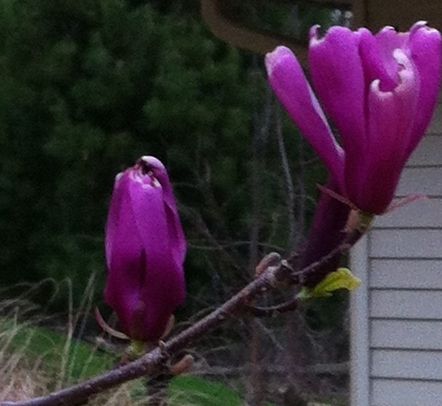I have learned a lot in the short time I've been gardening. In over a decade of apartment life; I had to find other outlets for tinkering with herbs, flowering bushes, plants, and trees. Now that I own a home and a yard there are plenty of places for my experiments. Gardens are a celebration. In a non-deliberate and often gentle way, they reflect their owner's personality. What do gardens teach us? I'll share a few of their lessons.
Life is beautiful: I'm guessing blood pressure drops with exposure to fresh air or when entering a garden environment in general. Even if there weren't health benefits; gardens feed us in every way. If they weren't beautiful, we wouldn't need gardens around hospitals for patients, or recreational gardens with walking paths, and rose gardens.
Don't miss an opportunity: An empty lawn is like a blank canvas. Before I became a novice lawn decorator, I saw a friend's empty backyard and our planning began. We framed her fence and edges all around with an array of perennials like roses, Russian sage, and lamb's ear. We loved to move plants to new spots to see how they would look aesthetically and how the plants would prosper or fill-out by the corner of the house, along and through the fence, or bordering the garage. Beginning with a few flowers, it spiraled into a full garden. It is a lot like moving furniture when you move plants- in that you can never quite tell how it will work until you try it in the new spot. When you get a garden thriving, the negative space becomes precious in both a utilitarian and ornamental fashion. The unused portions of the garden can guide the onlooker's eyes along the edges and back into the lush landscape.
Survival is fragile, even fickle: Over 80% of gardeners attempt to plant tomatoes, which are native to the United States. Tomatoes are sturdy but not fool-proof. They need full sun and the right amount of water. It isn't a plant you can entirely ignore. Still, tomatoes are manageable. There are plenty of other plants that are finicky or strange or do not adapt well to other climate zones. I suppose people are not all that different from plants. Some are hardy, while others are delicate. Some are dependable while others are flighty; some are invasive while others keep to themselves. There are many varieties to choose from.
A little effort goes a long way: Delicate plants can be fragile, while others are hard to pare down. If you've ever planted hostas, you know they'll just sit there as promised and come back ever year like clockwork. Daffodils, tulips, bleeding hearts, are similarly predictable. Lily of the valley and mint are both aromatic and love to spread. They need uprooting and restriction methods.
Nature relaxes us, even a little of it: Bright colors are good for your brain and so is fresh air. By gardening you are going outside more. You're even burning more calories toting those pots, bags, and watering cans around. Besides these stress relievers, gardens teach us to plant and let go to a certain extent. Not every plant is perfect or exact.
Patience is a virtue: When you aren't thinking about it your plants are outside growing. You find one day, your plants are changing how you wanted them to. For example, we have a newly-planted baby Magnolia tree adorning the front yard. It was planted at a tilted angle by the store's delivery service. With a tiny bit of staking and tying to guide it straight, it was a pleasant surprise when it was no longer leaning. Gardens are full of gifts and unexpected ongoings.
Your patience pays off: In a garden, things are happening with or without you. Nothing is happening in a garden to a non-gardener. Maybe a butterfly passes by. The understanding that you encouraged the butterfly to live there goes missing. This year's new experiment is adding vegetables. I have never eaten anything from my own garden yet. Fresh food should not be a disappointment.
You have some control over your life: There are about a million metaphors for planting, gardening, and watching life grow. As a gardener, you have the freedom to take what you are given and put it in this earth. You can swap and trade plants out with friends. You can gift tomatoes or rhubarb if you have a good yield. You can pick bouquets for your dining room table. Most importantly, you can do, or plant, precisely whatever you want.

No comments:
Post a Comment